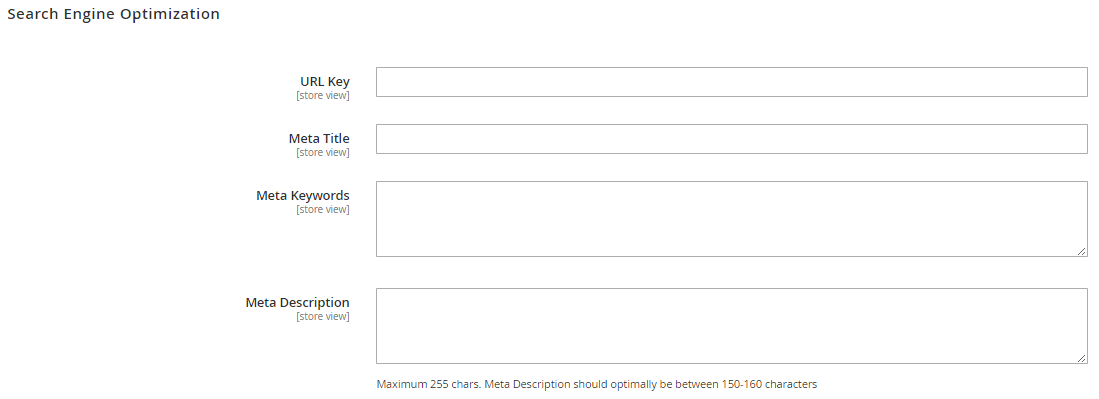Magento SEO optimization helps to improve website visibility, increases organic traffic, and drives sales. SEO in Magento 2 offers the ultimate user experience by making the site faster, more accessible, and easier to navigate, which can lead to increased engagement and conversion rates.
Search Engine Optimization (SEO) is a set of techniques that can either make or break a website: it literally makes the site visible to search engines and, therefore, to customers. Knowing this, the Magento development team has equipped the platform with a number of features you can use to make your website more attractive to search engines. Let’s have a look at what SEO with Magento looks like.
Meta Information or How SEO for Magento 2 Makes Products Visible
Meta data helps search engines to understand what your site or a particular page is all about and determine whether it’s worth being shown on search result pages or not. So one of the most important things Magento store owners can do in terms of SEO is adding meta data for every single product in the catalog. Magento allows you to enter such meta-data as Meta Title, Meta Keywords, and Meta Description that is basically almost all meta data you need to help search engines index your website.

Magento 2
Even though Google doesn’t place a value on meta keywords, other search engines do use this information quite frequently. To appear in Google, there still needs to be a bit more context to understand whether content, products, and services are relevant to users, so it’s a good practice to include high-value keywords in titles and URL keys of your products and related content.
How to configure in Magento 2
[Admin panel] ⇒ Products ⇒ Product ⇒ Search Engine Optimization
Sitemap or Let Search Engines Discover Your Website
The main function of a sitemap is to show search engines all the pages available for crawling. Magento provides a built-in feature that generates a standard compliant sitemap in XML format containing the URLs for Category pages, Product pages, and CMS pages: just go to the admin panel, generate a sitemap and send the crawlers where you want them to go.
How to configure in Magento 2
[Admin panel] ⇒ Stores ⇒ Configuration ⇒ Catalog ⇒ XML Sitemap
User-friendly URLs or How Magento 2 SEO Features Makes Links Readable
The huge advantage of URLs in Magento is that they have a more understandable format for both search engines and users. Though a lot of shopping carts have improved the syntax of their URLs over time, there are still a lot of platforms that generate URLs containing random symbols instead. To illustrate it, let’s look at URLs of two sites: one built on OsCommerce and another one — on Magento.
OsCommerce
domain_name.com/–p-50.html?osCsid=44b549e6af47bb524e845ce5439c8716
Domain name + something completely unreadable
Magento
domain_name.com/drysuits/ocean-rodeo-soul-kiteboarding-drysuit
Domain name + category keyword + product keyword
Magento creates understandable URLs by default: all you need is to properly name categories and products and voila ー SEO-friendly URLs are ready. But if you need to include particular keywords into URLs, you can always specify them in corresponding areas anytime.
How to configure in Magento 2
[Admin Panel] ⇒ Stores ⇒ Configuration ⇒ Web ⇒ Multiple options for URLs
URL Rewrites or How to Come Up With Concise URLs
Magento also has a native URL rewrite tool that allows you to clean up the URLs: change any URL that is associated with any webpage, add custom URL rewrites as well as specify URL redirect scenarios to.
How to configure in Magento 2
[Admin Panel] ⇒ Marketing ⇒ URL rewrites ⇒ Page
Google Rich Snippets or Let Search Engines Show More Info About You
Search engines can show additional information about your products and services on the search result page ー that’s what rich snippets are all about. In Magento this feature is available for the rebuilt Magento 2 platform.
SEO Magento Extensions: Free and Paid

To improve your search engine rankings, you can also take advantage of various Magento extensions that are specially designed to expand basic SEO features.
Advanced SEO Suite
Price: $149-248
Compatibility: Magento Open Source, Abode Commerce
Company: Mirasvit
Features provided by Advanced SEO Suite range from URL optimization to frontend and Google sitemap optimization options. To be more precise, you can set unique meta tags and H1 headings, as well as replace standard links with friendly URLs for layered navigation and product images. They also give you the added ability to add links to your sitemap and automatically generate image Alt text, etc.
Attribute Splash Pages
Price: Free
Compatibility: Magento Open Source
Company: Fishpig
This extension enables you to create landing pages for your product attributes. Landing pages (or splash pages) have their own SEO URL, custom meta, product lists, and layered navigation. Moreover, Attribute Splash Pages supports multi-store functionality, so it can be used to create splash pages for different stores. If your attributes have already been configured, the process of creating your splash page will take less than a minute, and will automatically begin influencing your SEO.
Conclusion
We’d like to point out that Magento can boast a solid out-of-the-box SEO functionality that is easily extended if needed with any of the aforementioned extensions in this article or with additional Magento development. It’s vital to keep in mind that the SEO is constantly evolving, and striving for high rankings requires due diligence. It’s crucial that one must keep up with all these changes and be as up-to-date as possible to get the best results for their brand.




